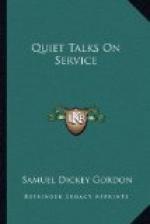God’s Use of Weak Things.
It is true that over and over again God has used men utterly weak and foolish and despised in the light of life’s common standards. He wants men of the best mental strength, of the finest mental training, and He uses such when they are willing to be used, and governed by the true God-standards of life. But talent seems specially beset with temptation. The very power to do great things seems often to bewilder the man possessing it. Wrong ambition gets the saddle and the reins and whip too, and rides hard.
Frequently some man who had not guessed he had talent, born in some lonely walk of life, without the training of the schools, is used for special leadership. It takes longer time always. Early mental training is an enormous advantage. Carey the cobbler had mental talents to grace a Cambridge chair. It took a little longer time to get him into shape for the pioneer work he did in India. Duff’s training gave him a great advantage.
But God is never in a hurry. He can wait. What He asks is that we shall bring the best we have natively, with the best possible training, and let Him use us absolutely as He may wish. And always remember that every mental power is a gift from Him; that actual power in life must be through Him only; and that mental gifts are not serviceable save as they are ever inbreathed by His own Spirit.
This word of Paul’s finds most graphic illustration in the book of Judges. Judges should be put alongside of the first chapter of First Corinthians. It is a series of pictorial illustrations of what Paul is saying there. These two books, Joshua and Judges, side by side in the Old Testament stand in sharpest contrast. The keynote of Joshua is victory; of Judges defeat. There’s music in both, but contrasted music. Joshua rings with songs in the major key, triumphant, militant, joyous, victorious.
The music of Judges is in the minor, sad and weeping, with the harps hanging on the willows. Joshua is upon the mountain top with sun shining and air bracing and outlook inspiring. Judges is down in the valley bottoms, dark and gloomy, and depressing. Yet Judges has bright spots, and has spurts of good music interspersed. It is a study in lights and shadows, bright lights, and dark shadowings, but with the blacker tints intensifying and overcoming the others.
There are here seven striking illustrations of God’s use of strange unusual means, such as are reckoned weak and trivial. A left-handed man uses that peculiarity to get a great victory and eighteen years of freedom for the nation.[24] A farmer with as homely a weapon as an ox-goad delivers his people from oppression.[25] Men came to be so scarce, that is men that were men enough to take their true place as leaders, that a woman had to step into the breach, and assume leadership. But the student of history and of modern times is used to that. The result was great victory, and a forty years’ rest from the nation’s enemies.[26]




